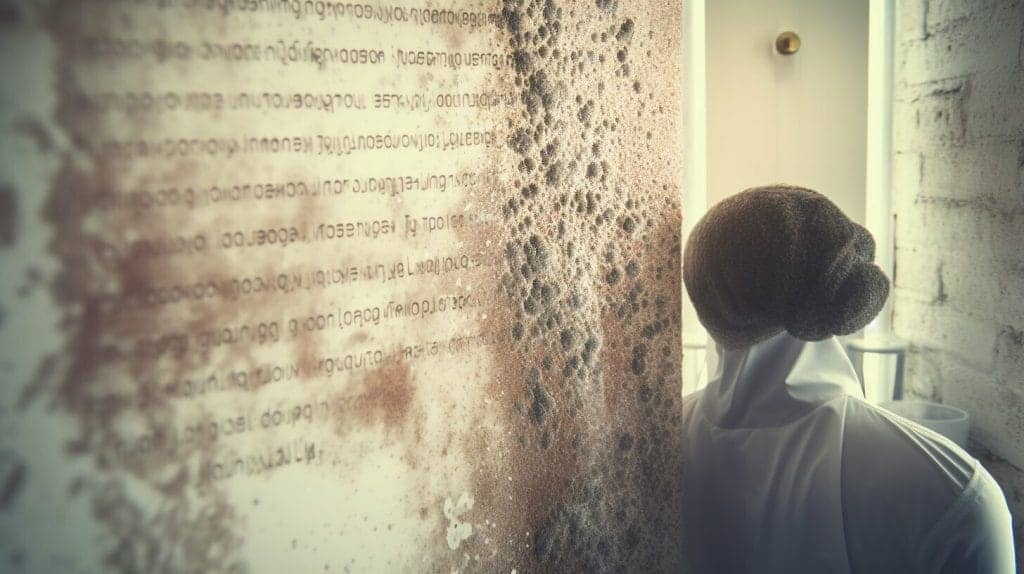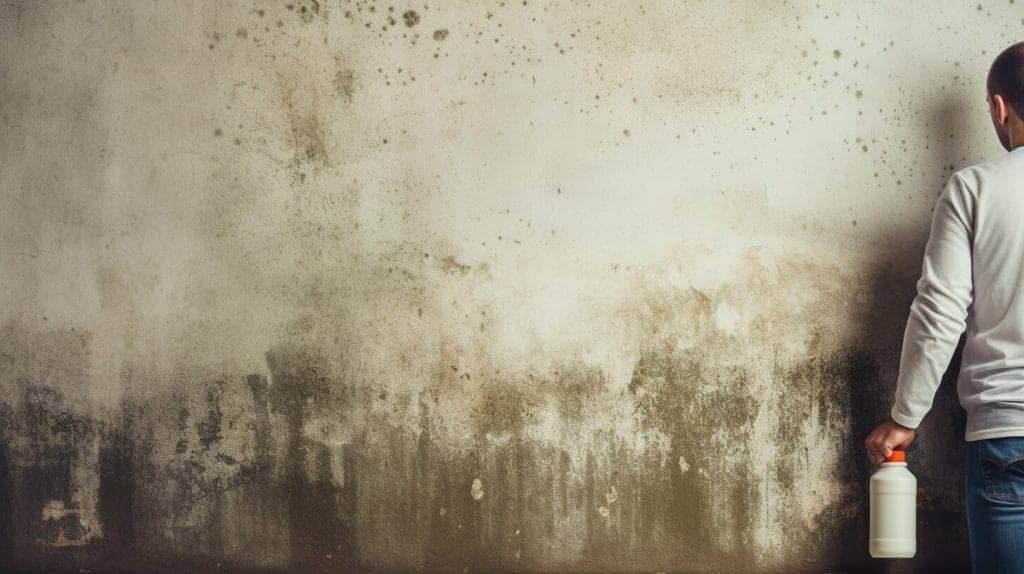Welcome to our guide on mold poisoning. Mold is a fungus that can grow almost anywhere, and exposure to it can have serious health consequences. In this section, we’ll introduce you to the symptoms and causes of mold poisoning, as well as provide you with tips on how to prevent exposure. It is important to note that mold poisoning can be a serious health concern, so it’s essential to stay informed and take steps to protect yourself and your loved ones.
Mold exposure can occur both indoors and outdoors, and its impact on health can range from mild irritation to severe allergic reactions. Let’s dive into the details and learn more about the dangers of mold exposure and how to prevent it.
Understanding Mold Poisoning
Mold poisoning is a serious health concern that can impact the lives of individuals in a variety of ways. Understanding the effects of mold on human health is essential for effective prevention and treatment of mold exposure.
What is Mold Toxicity?
Mold toxicity, also known as mold illness or mycotoxicosis, is caused by the toxins released by different types of molds. These toxins can become airborne and enter the body through inhalation, ingestion, or skin contact. Long-term exposure to mold toxins can lead to chronic health problems that can take years to manifest.
What are the Health Effects of Mold Exposure?
| Respiratory Issues | Neurological Problems | Skin Irritation |
|---|---|---|
| Mold exposure can lead to a range of respiratory problems, including wheezing, coughing, and difficulty breathing. These symptoms are particularly severe for individuals with asthma or other preexisting respiratory conditions. | Neurological symptoms of mold exposure include memory loss, brain fog, and difficulty concentrating. These symptoms can last for months or even years after exposure to mold toxins. | Mold exposure can cause skin irritation, including itching, redness, and rashes. This is particularly true for individuals with sensitive skin. |
Other potential health effects of mold exposure can include headaches, fatigue, and digestive problems.
How Does Mold Affect Indoor Air Quality?
Mold can grow in any environment that is warm, moist, and has organic matter to feed on. This makes indoor environments particularly susceptible to mold growth, especially in bathrooms, kitchens, and basements. Over time, mold growth can reduce the quality of indoor air and lead to a range of health problems for occupants.
Improving indoor air quality is an important part of preventing mold exposure and ensuring the health and safety of occupants. Proper ventilation, regular cleaning, and moisture control are essential for maintaining a healthy indoor environment.
The Importance of Indoor Air Quality
Indoor air quality plays a critical role in preventing mold exposure and the associated health effects. Poor air circulation and high humidity levels create ideal conditions for mold growth and can lead to the development of toxic mold. Toxic mold, such as black mold, can produce harmful mycotoxins that can cause serious health problems, including respiratory issues, fatigue, and cognitive impairment.
It is important to be aware of the symptoms of toxic mold exposure, which can include respiratory problems, skin irritation, headaches, and flu-like symptoms. These symptoms may worsen over time and can lead to the development of chronic health conditions.
Regular cleaning and maintenance of your home can help prevent mold growth, as can proper ventilation and air circulation. Humidity levels should be kept below 50% to discourage mold growth, and any water damage or leaks should be addressed promptly to prevent mold from developing.
If you suspect that you have a mold problem in your home, it is important to seek professional mold remediation services. Attempting to handle the problem yourself can lead to further mold spread and potential health risks.
Symptoms of Toxic Mold Exposure
The symptoms of toxic mold exposure can vary depending on the individual and the severity of the exposure. Common symptoms include:
- Respiratory problems, including coughing, wheezing, and shortness of breath
- Headaches and migraines
- Skin irritation, including rashes and hives
- Fatigue and weakness
- Cognitive impairment, including memory loss and difficulty concentrating
If you experience any of these symptoms, especially in combination, it is important to seek medical attention right away.
Common Causes of Mold Poisoning
Mold exposure can occur anywhere, and it’s important to be aware of the most common sources of mold to prevent potential health issues.
Damp Environments
Mold thrives in damp environments, which is why it’s commonly found in bathrooms, kitchens, and basements. Leaky pipes, poor ventilation, and condensation buildup can all contribute to dampness in these areas.
Water Damage
Water damage from flooding or leaks can create the perfect environment for mold growth. It’s important to address any water damage promptly to prevent mold from spreading.
Poor Ventilation
Poor ventilation can also contribute to mold growth, as it increases humidity levels and reduces air circulation. This is especially common in older buildings or homes that lack proper ventilation systems.
High Humidity
High humidity levels can also lead to mold growth. In areas with high humidity, using a dehumidifier can help to control moisture levels and prevent mold growth.
Unsanitary Conditions
Unsanitary conditions can also contribute to mold growth, especially in areas with poor hygiene practices. This is why it’s important to maintain a clean and sanitary environment in all areas of your home or workplace.
Who is at Risk of Mold Poisoning?
While exposure to mold can impact anyone, certain factors can increase a person’s susceptibility to mold poisoning.
Age can play a role in susceptibility to mold, with young children and the elderly being at greater risk. Those with preexisting health conditions, such as asthma or allergies, may also be more vulnerable to mold exposure. Additionally, individuals with weakened immune systems, such as those undergoing chemotherapy or with HIV/AIDS, may be more susceptible to the health effects of mold toxicity.
Lifestyle factors can also contribute to susceptibility to mold poisoning. Those who smoke or have a poor diet may be more prone to respiratory issues and other health problems associated with mold exposure. Finally, environmental factors such as living in a damp or poorly ventilated space can increase a person’s risk of mold exposure and poisoning.
Common Symptoms of Mold Poisoning
Mold poisoning can result in a variety of symptoms, depending on the level of exposure and the individual’s susceptibility. Some of the most common symptoms of mold poisoning include:
| Symptom | Description |
|---|---|
| Respiratory Issues | Mold spores can cause respiratory problems such as coughing, wheezing, shortness of breath, and chest tightness. Prolonged exposure to mold can also lead to asthma or other chronic respiratory conditions. |
| Skin Irritation | Exposure to mold can cause skin irritation such as rashes, hives, or redness. This can be especially common in individuals with sensitive skin. |
| Neurological Symptoms | Mold toxins can also affect the central nervous system, leading to symptoms such as headaches, dizziness, fatigue, and difficulty concentrating. In severe cases, mold exposure can lead to memory loss and other cognitive impairments. |
| Eye Irritation | Mold spores can cause eye irritation such as redness, itching, and watering. This can be especially common in individuals who wear contact lenses or have preexisting eye conditions. |
| Gastrointestinal Issues | Mold exposure can also cause gastrointestinal problems such as nausea, vomiting, and diarrhea. These symptoms can be especially common in individuals with preexisting digestive conditions. |
If you experience any of these symptoms and suspect that mold may be the cause, it’s important to seek medical attention. A healthcare provider can help diagnose mold poisoning and provide appropriate treatment.
Testing for Mold Poisoning
Testing for mold in your home or workplace is an important step in protecting yourself and your family from potential health hazards. There are a few different methods of testing for mold, ranging from DIY testing kits to professional mold detection services.
DIY Testing Kits
DIY mold testing kits are widely available and can be purchased online or at your local home improvement store. These kits usually involve taking swab or air samples and sending them to a lab for analysis. While these tests can be a convenient and affordable way to test for mold, they may not be as accurate as professional testing services and may miss certain types of mold.
Professional Mold Detection Services
Professional mold detection services can provide a more comprehensive and accurate analysis of mold in your home or workplace. These services typically involve a thorough inspection of the property, air and surface sampling, and a detailed report on the type and extent of mold present. While more expensive than DIY kits, professional mold detection services can provide greater peace of mind and ensure that all potential mold hazards are identified and addressed.
Treating Mold Poisoning
If you suspect that you have been exposed to mold and are experiencing symptoms of mold poisoning, it is essential to seek medical attention. A healthcare provider will be able to diagnose mold toxicity and prescribe appropriate treatment options.
The course of treatment for mold poisoning will depend on the severity of your symptoms and the extent of your exposure to mold. In some cases, simply removing yourself from the source of mold exposure may be enough to alleviate symptoms.
For more severe cases of mold toxicity, your doctor may prescribe medication to manage symptoms such as respiratory distress, skin irritation, and neurological symptoms. Supplements and lifestyle changes, such as dietary modifications and stress reduction techniques, may also be recommended.
It is important to note that while there are treatment options available for mold poisoning, the best course of action is to prevent exposure to mold in the first place.
The Importance of Mold Prevention
Mold is a common problem in many homes and can cause serious health issues if left untreated. Preventing mold growth is crucial for maintaining a healthy indoor environment and avoiding mold poisoning. Here are some tips for preventing mold in your home:
- Keep humidity levels low, below 50%.
- Use an air conditioner or dehumidifier during humid months.
- Fix any leaks or water intrusions promptly.
- Ensure proper ventilation in bathrooms, kitchens, and laundry rooms.
- Use mold-resistant paints and building materials.
- Clean and dry any surfaces affected by water within 24-48 hours.
If you suspect there is mold in your home, it is important to take action right away. Mold can spread quickly and cause serious health problems, especially for those with preexisting conditions. Professional mold remediation services can help eliminate mold and prevent future growth.
By following these mold prevention tips, you can improve your indoor air quality and reduce the risk of mold poisoning in your home.
Maintaining a Healthy Home Environment
To prevent mold poisoning and promote good health, it’s important to maintain a healthy home environment. Here are some tips:
- Proper ventilation is key to reducing humidity and preventing mold growth. Make sure your home is well-ventilated, especially in areas prone to moisture like bathrooms and kitchens. Consider installing exhaust fans to help remove excess moisture.
- Air filtration systems can help remove mold spores and other indoor pollutants from the air. Look for high-quality air filters with a MERV rating of at least 8 and change them regularly.
- Regular cleaning and maintenance can help prevent mold growth. Clean up spills and leaks promptly, and keep surfaces dry and free of moisture.
- Mold thrives in humid conditions, so it’s important to keep indoor humidity levels below 60%. Use a dehumidifier if necessary.
- Natural remedies can also be effective for preventing mold growth. Essential oils like tea tree, thyme, and cinnamon have antimicrobial properties and can be used to clean and disinfect surfaces.
By following these tips, you can help maintain a healthy home environment and reduce your risk of mold poisoning.
Common Misconceptions About Mold Poisoning
Despite the growing awareness of the dangers of mold poisoning, there are still several misconceptions that persist. Below are some of the most common misconceptions about mold poisoning:
- Myth: Only black mold is dangerous.
Fact: While black mold is one of the most well-known and toxic types of mold, other types of mold can also be harmful to human health. - Myth: Mold exposure is not a serious health concern.
Fact: Mold exposure can cause a range of symptoms and health problems, including respiratory issues, skin irritation, and neurological symptoms. - Myth: Mold is only a problem in older buildings.
Fact: Mold can grow in any building with high humidity or moisture levels, regardless of its age or condition. - Myth: Bleach is an effective solution for removing mold.
Fact: Bleach can actually worsen a mold problem, as it can release mold spores into the air and does not eliminate the root cause of the mold growth.
Additional Misconceptions:
It is important to stay informed about the dangers of mold poisoning and to dispel any misconceptions or myths that may prevent individuals from taking proper precautions. Consulting with a professional mold remediation service can provide further insight and guidance on how to prevent mold exposure and protect your health.
The Legal Issues Related to Mold Poisoning
Mold poisoning can have serious health consequences, and in some cases, it may be the result of negligence or misconduct on the part of property owners or landlords. As a result, there are legal issues related to mold poisoning that individuals should be aware of.
If you have experienced mold poisoning as a result of living or working in a property with mold, you may be able to pursue legal action against the responsible parties. This can include property owners, landlords, and even contractors who were hired to perform work on the building.
| Legal Issues | Description |
|---|---|
| Mold Liability Lawsuits | Individuals who have experienced mold poisoning may be able to file a lawsuit against the responsible party for compensation for medical expenses, lost wages, and pain and suffering. |
| Property Owner Liability | Property owners have a responsibility to maintain safe living and working conditions for their tenants and guests. If mold is present on their property, they may be held liable for any resulting health issues. |
| Landlord-Tenant Laws | Landlords are required to provide habitable living conditions for their tenants, which includes maintaining a mold-free environment. Tenants may have legal recourse if their landlord fails to address mold issues in a timely and effective manner. |
If you believe that you have been a victim of mold poisoning as a result of someone else’s negligence, it is important to consult with a qualified attorney who specializes in these types of cases. They can help you understand your legal options and work to ensure that you receive the compensation you deserve.
The Long-Term Impact of Mold Poisoning
Mold poisoning can have significant long-term effects on a person’s health, particularly if left untreated. While the symptoms of mold exposure can vary widely depending on the individual, the severity and duration of exposure, and the type of mold involved, there are several potential long-term health effects that have been associated with mold toxicity.
| Long-Term Health Effects of Mold Poisoning |
|---|
| Respiratory issues, including chronic bronchitis and asthma |
| Neurological problems, such as memory loss, confusion, and difficulty concentrating |
| Frequent headaches and migraines |
| Chronic fatigue and weakened immune system |
| Joint pain and muscle weakness |
| Gastrointestinal issues, including nausea and diarrhea |
| Increased risk of certain cancers, such as lung cancer and leukemia |
It is important to note that not everyone who is exposed to mold will experience these long-term health effects. However, those who are already susceptible to respiratory issues or have preexisting medical conditions may be at a higher risk for developing mold-related health problems.
Reducing the Risk of Long-Term Health Effects
The best way to reduce the risk of long-term health effects from mold poisoning is to seek medical attention as soon as possible if you suspect that you have been exposed to mold. Your doctor can assess your symptoms and recommend appropriate treatment options, which may include medication, supplements, or lifestyle changes.
It is also important to address any mold issues in your home or workplace promptly to prevent further exposure. This may involve hiring a professional mold remediation service to remove the mold and repair any water damage that may be contributing to the problem.
Other steps you can take to reduce your risk of mold exposure include:
- Keep indoor humidity levels below 60%
- Use exhaust fans in bathrooms and kitchens
- Fix leaks and water damage promptly
- Use mold-resistant products, such as paint and drywall
- Clean and dry any areas that are damp, such as basements and bathrooms
By taking these steps and seeking medical attention if you suspect that you have been exposed to mold, you can reduce your risk of long-term health effects and maintain your overall well-being.
Resources for Mold Poisoning Prevention and Treatment
Whether you are looking to prevent mold exposure or seeking treatment for mold poisoning, there are a variety of resources available to help you. Here are some organizations and agencies that can provide information and assistance:
| Organization/Agency | Website |
|---|---|
| Environmental Protection Agency (EPA) | https://www.epa.gov/mold |
| Centers for Disease Control and Prevention (CDC) | https://www.cdc.gov/mold/default.htm |
| American Lung Association | https://www.lung.org/lung-health-diseases/healthy-air/home/resources/mold-brief |
| Indoor Air Quality Association (IAQA) | https://www.iaqa.org/ |
| National Association of Realtors (NAR) | https://www.nar.realtor/mold-reform-act |
| Occupational Safety and Health Administration (OSHA) | https://www.osha.gov/SLTC/mold/ |
| Mold Help Organization | https://mold-help.org/ |
| National Institute of Environmental Health Sciences (NIEHS) | https://www.niehs.nih.gov/health/topics/agents/mold/index.cfm |
In addition to these resources, many local and state health departments offer information and assistance with mold prevention and treatment. It is important to consult with a healthcare professional if you are experiencing symptoms of mold poisoning or have concerns about mold exposure in your home or workplace.
Frequently Asked Questions About Mold Poisoning
Here are some of the frequently asked questions about mold poisoning:
Q: What is mold poisoning?
A: Mold poisoning is a condition that occurs when a person is exposed to high levels of mold. The symptoms of mold poisoning can vary from person to person and can range from mild to severe.
Q: What are the symptoms of mold poisoning?
A: The symptoms of mold poisoning may include respiratory issues, skin irritation, headaches, fatigue, and neurological symptoms. If you suspect that you may have mold poisoning, it is important to see a doctor right away.
Q: Can mold poisoning be prevented?
A: Yes, mold poisoning can be prevented by keeping your home clean and dry. This includes fixing any water leaks, using dehumidifiers, and cleaning up any spills or leaks as soon as possible.
Q: How is mold poisoning diagnosed?
A: Mold poisoning can be diagnosed through a combination of physical examination, symptoms, and testing. A doctor may also order blood or urine tests to confirm the presence of mold toxins in your body.
Q: How is mold poisoning treated?
A: Treatment for mold poisoning may include medications, supplements, and lifestyle changes. Your doctor may also recommend that you see an allergist or immunologist for additional treatment.
Q: Can mold poisoning cause long-term health problems?
A: Yes, mold poisoning can cause long-term health problems, especially if exposure is prolonged. Prolonged exposure to mold can lead to respiratory issues, neurological problems, and other chronic health conditions.
Q: Who is at risk of mold poisoning?
A: Anyone can be at risk of mold poisoning, but individuals with preexisting health conditions such as asthma or allergies, as well as children and the elderly, may be more susceptible to the harmful effects of mold exposure.
Q: Can I test for mold poisoning at home?
A: DIY mold testing kits are available, but they may not be as accurate as professional mold detection services. If you suspect that you have mold poisoning, it is important to see a doctor for a proper diagnosis and treatment.
Q: What should I do if I find mold in my home?
A: If you find mold in your home, it is important to have it removed as soon as possible. You can either try to remove it yourself or hire a professional mold remediation service to do it for you.
Dr. Francisco Contreras, MD is a renowned integrative medical physician with over 20 years of dedicated experience in the field of integrative medicine. As the Medical Director of the Oasis of Hope Hospital in Tijuana, Mexico, he has pioneered innovative treatments and integrative approaches that have been recognized globally for the treatment of cancer, Lyme Disease, Mold Toxicity, and chronic disease using alternative treatment modalities. Dr. Contreras holds a medical degree from the Autonomous University of Mexico in Toluca, and speciality in surgical oncology from the University of Vienna in Austria.
Under his visionary leadership, the Oasis of Hope Hospital has emerged as a leading institution, renowned for its innovative treatments and patient-centric approach for treating cancer, Lyme Disease, Mold Toxicity, Long-Haul COVID, and chronic disease. The hospital, under Dr. Contreras's guidance, has successfully treated thousands of patients, many of whom traveled from different parts of the world, seeking the unique and compassionate care the institution offers.
Dr. Contreras has contributed to numerous research papers, articles, and medical journals, solidifying his expertise in the realm of integrative medicine. His commitment to patient care and evidence-based treatments has earned him a reputation for trustworthiness and excellence. Dr. Contreras is frequently invited to speak at international conferences and has been featured on CNN, WMAR2 News, KGUN9 News, Tyent USA, and various others for his groundbreaking work. His dedication to the medical community and his patients is unwavering, making him a leading authority in the field.
Contreras has authored and co-authored several books concerning integrative therapy, cancer, Lyme Disease and heart disease prevention and chronic illness, including "The Art Science of Undermining Cancer", "The Art & Science of Undermining Cancer: Strategies to Slow, Control, Reverse", "Look Younger, Live Longer: 10 Steps to Reverse Aging and Live a Vibrant Life", "The Coming Cancer Cure Your Guide to effective alternative, conventional and integrative therapies", "Hope Medicine & Healing", "Health in the 21st Century: Will Doctors Survive?", "Healthy Heart: An alternative guide to a healthy heart", “The Hope of Living Cancer Free”, “Hope Of Living Long And Well: 10 Steps to look younger, feel better, live longer” “Fighting Cancer 20 Different Ways”, "50 Critical Cancer Answers: Your Personal Battle Plan for Beating Cancer", "To Beat . . . Or Not to Beat?", and “Dismantling Cancer.”









